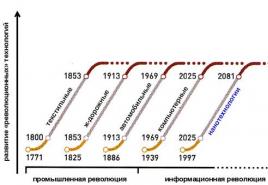Conditions for increasing the productivity of mental activity. And productive thinking The difference between reproductive productive and creative levels of thinking
There are people who entertain themselves by thinking, and for them productive thinking is just boring. For creative people, productive thinking, where the flow of thoughts, images and sensations is purposeful, where there is an understanding of what is happening, the birth of new life meanings and the solution of life problems - such thinking has the highest value.
The orangutan cannot reach the fish in the river, but a rather long stick lies next to him. When the orangutan understands the connection between the stick and the fish that needs to be reached, this is productive thinking.
Productive thinking is finding connections between objects and phenomena that solve a life problem. This is the ability to turn on to look for a solution to certain things to do. This is a view of the situation that solves a particular problem. Synonym - think. Thinking productively means thinking about what you need to think about, when you need to think about it, and how you need to think about it. And this means:
Train yourself to think specifically.
“Work on yourself,” “Improving yourself,” “Eradicating your shortcomings” are beautiful words, but usually there is nothing behind them. And the one who uses such words most often marks time in one place.
“Get up, Count! Great things await you!”, “The morning begins with exercise,” “I got up and made the bed,” “I left the house and straightened my shoulders” - things are simple and concrete. And the benefits of such thoughts and practical instructions to oneself are great.
Avoid emptiness in your thoughts. Stop burdening yourself with thoughts that will lead you nowhere.
Don’t start a conversation about it, don’t go to those people where these conversations will arise, don’t read anything that will push you to these thoughts. Keep yourself busy with something simple and useful. For example, for you in the near future this is: ... What?
Have a plan for your affairs and think about what you need to think about now.
If you have a piece of paper in front of your eyes where you write down the activities of the upcoming day, everything becomes easier - this business sheet will organize you. If you have friends who are efficient people, your thinking will be organized by your friends. Being around them always makes you think about good things. About what is necessary.
Think in such a way as to come to results that will please you and be useful to you and the people around you.
How is this? (For example)
Let's say you're thinking about your job.
Are you planning to change anything there? Are you really planning to change anything there? If yes, then think further, and definitely. If not, then stop thinking and get down to business.
Unfortunately. And naturally they were upset.
Curious: why then did you think about it like that? Has it boosted your self-confidence and will help you accomplish the things that lie ahead of you? Figure out how you can think differently about yourself so that you believe in yourself and teach yourself at least a small thing that will be useful to you in your work.
Learn to type with ten fingers? Stop making excuses? Anything else?
Record this helpful insight in your journal. Or you can think about it and make serious decisions. It’s your life, one, why not? So, “I am contemplating such a serious decision...”
Unproductive thinking
If we distinguish productive thinking, then there is also another kind of thinking: unproductive. What is it, what is it like? It seems that this is a whole world of a wide variety of thinking options: for example, this is internal chatter - relatively coherent, sometimes even logical, but inappropriate thinking that fills the emptiness of the soul, entertaining and creating the illusion that life is filled with something. These are empty dreams and variants of defensive-aggressive thinking, ready to destroy any logic for the sake of preserving internal comfort.
I have often met people who said that they do not like to think. In any difficult life situation they tried to fill their time with some activities, meetings, and so on - just so as not to be left alone with their thoughts. Moreover, this applies both to really difficult cases and to simply unpleasant situations. Typically, such people avoid loneliness, need to be listened to and given advice - as if shifting the need to think about the problem onto others. Trying to find out through communication why they don’t like to think, I came to the conclusion that one of the key reasons is that their thinking is unproductive. What they consider thinking is actually not such, because, unlike real thinking, it does not bring any final product. To clarify, here are examples of productive and unproductive thinking.
- Let's say a person is faced with some problem. A person begins to think about this problem - about how big and complex it is, about how much trouble it will bring him, about how bad everything is in his life, and so on. This is an example of unproductive thinking. There is no benefit from such thinking, but the harm is obvious: the more you think about the problem, the more complicated it seems, the more frightening it is, the wider the abyss of despair and hopelessness lies ahead. It is not surprising that people who think this way are afraid and avoid these thoughts. You need to think about the problem correctly so that ultimately, in the course of these thoughts, you can find its solution. That is, when thinking about a problem, you need to think about how you can solve it, what needs to be done for this, where to find necessary information, which will help in resolving it, etc.
- Another example. Let's say some unpleasant situation happened to a person that does not show him in the best light. An example of unproductive thinking in this case would be fixation on this situation, worrying about it, constant mental “overthinking” of the situation, exaggerating its importance and thus increasing one’s suffering. In this case, it will be productive to think about what this situation teaches, what conclusions should be drawn from it, whether a person can influence it, correct something - in himself or in the situation.
- The feeling of guilt for something is probably familiar to everyone. Here, too, two approaches to thinking about the situation can be distinguished - unproductive and productive. The first assumes that a person engages in self-flagellation, psychologically “punishing” himself for an offense. In the second, a person understands that self-flagellation has no benefit to anyone, and he needs to think about how to atone or at least compensate for his guilt and the damage caused.
- Another example. A man has a dream. If he thinks productively, he will think about how to achieve his dream, how to realize it, what needs to be done for this, what resources he needs, and will think about drawing up a plan to realize his dream. In the case of unproductive thinking, a person will think about his dream, imagine how wonderful it will be if it comes true, he will draw in his thoughts various beautiful pictures of what his life will be like after reaching the limits of his dreams and... that’s all. There will be no thoughts in the direction of what he needs to do to achieve his dream, and no actions in the same direction - and even more so.
Productive, or creative, is called thinking that generates any new, previously unknown material (object, phenomenon) or ideal (thought, idea) product. Productive, for example, is the thinking of a scientist conducting a new research and making as a result of it scientific discovery , a writer who creates something new literary work, artist, writer new picture.
Reproductive is thinking that deals with such problems, the solution to which someone once already found. Reproductive thinking, for example, is engaged in by an artist who redraws another artist’s painting, that is, by creating it reproduction. Reproductive thinking is practiced by people who are in the process of learning decide any learning objectives . In reproductive thinking, a person follows an already traveled, known path. As a result of this thinking nothing new is created.
FEATURES OF MUSICAL THINKING
J. Combardier wrote: “Music is the art of thinking with sounds.”
Musical thinking is intonational, i.e. operates with musical intonations. We can talk about the musical thinking of the era (Baroque or Romanticism), style (jazz or rock), composer (characteristic harmonies or intonations).
Practice has proven that in the process of musical education, the listener and performer develop not only reproductive, but also productive thinking: the listener creates new images in their imagination, and the performer creates a new interpretation.
Musician's Mind focuses mainly on the following:
· Thinking through the figurative structure of the work - possible associations, moods and thoughts behind them
· Thinking about the logic of thought development in the features of melody, harmony, rhythm, dynamics, agogics, form.
· Finding the most perfect ways to embody thoughts and feelings on an instrument or music paper. “I achieved what I wanted” - this is the final point, in the words of G. Neuhaus, of musical thinking in the process of performing and composing music.
QUESTION 9. Define the concepts of “emotions” and “feelings”. Tell us about their role in a person’s life. Name the types of fundamental emotions according to K. Izard. Classify emotional experiences.
We somehow react to everything that surrounds us in this world, what happens in our lives - we relate to everything in a certain way.
Emotion – direct experience in the moment.
Feeling– a more complex, permanent, established attitude of a person.
In the process of development, emotions first appear (they are associated with the satisfaction of the baby’s basic needs for food, care, security), and then feelings.
Carroll Izard identified 10 fundamental human emotions:
1. Interest-Excitement
2. Pleasure-Joy
3. Surprise
4. Grief-Suffering
6. Disgust
7. Contempt
9. Shame-Shyness
10. Guilt-Repentance
The role of emotions and feelings in human LIFE
Emotions tell us what significance various objects, events, and relationships with people have for us personally.
Emotions greatly influence all our thoughts and actions, depending on it we see or, conversely, do not notice something. In joy we find beauty and harmony everywhere, in grief everything appears in a dark light for us, in anger it seems that intrigues and obstacles are everywhere.
Emotions regulate human actions. For example, they can mobilize us, as if providing additional sources of energy. Likewise, emotions can act as a destructive force. Studies have shown that emotions of moderate intensity have a positive effect, while very intense ones lead to a negative result, sometimes to depletion of energy.
Emotions also act as a language of communication. It is through emotions that the mother contacts the baby, who cannot yet speak. Those who truly love each other are also able to communicate without words.
Emotions also help us understand the world. Any of our discovery of the world is accompanied by joy, anxiety, disappointment, i.e. intellectual processes are also emotionally charged.
CLASSIFICATION OF EMOTIONAL EXPERIENCES
Anyone accustomed to observing themselves will definitely notice how diverse emotional experiences can be. In psychology, it is customary to distinguish 2 large groups of emotions and feelings: positive (pleasure, joy, delight...) and negative (sadness, horror, hatred, grief, fear...).
Types of emotions: mood, affect, passion
Mood - long-term emotional state, general emotional background (calm mood or irritated, active or relaxed, elated or depressed).
Affect – a violent short-term outbreak of feelings that completely captures the personality. In a state of passion a person loses control of himself, he is capable of uttering words or performing actions for which he will later be embarrassed and ashamed. Affect can accumulate drop by drop: a person endures and endures, but one day an emotional explosion of accumulated irritation, fear, resentment, and pain occurs.
Passion - the most powerful and vivid emotional experience of a person. She is characterized by obsession. Passion can lead to both great discoveries, achievements, and disasters in a person’s life. It gives enormous energy for exploits, but can also become the cause of crime.
Types of feelings.
Intellectual feelings- feelings associated with cognitive activity person. They arise in the process of learning and scientific work, as well as creative activities in various types of art, science and technology. These are: curiosity, joy of discovery, thirst for knowledge, surprise, doubt, humor, irony, sarcasm, cynicism.
Moral feelings - feelings that reflect a person’s attitude to the requirements of public morality. They are associated with a person’s worldview, his thoughts, ideas, principles and traditions. These are: love, partnership, honor, affection, hatred, cowardice, envy, conscience...
Aesthetic feelings are feelings that arise in a person in connection with the satisfaction or dissatisfaction of his aesthetic needs. These include feelings of beauty and ugliness, sublime or base, etc.
Productive thinking is thinking during which new knowledge arises. It can be described as a type of thinking that produces a new end product that ultimately affects mental development. It is productive thinking that allows you not only to quickly and deeply absorb knowledge, but also to be able to apply it under new conditions.
Productive and reproductive thinking
Unlike productive thinking, the reproductive type is responsible only for the assimilation of information and the ability to reproduce it under approximately similar conditions. Despite the fact that this type of thinking will not allow you to make a discovery or introduce something new, it is very important, because without it it is difficult to obtain an initial knowledge base.
It is very simple to distinguish productive thinking from reproductive thinking: if the result is some new mental product, it means that thinking is productive. If in the process of thinking new knowledge is not formed, but only the process of reproducing knowledge occurs, then thinking is reproductive.
Development of productive thinking
In order to develop productive thinking, you first need to think specifically. Compare: “I will lose weight” and “I will not eat after six.” If the first statement is general and will most likely lead to nothing, then the second speaks of a specific intention and is productive.
It is important to train yourself to give up empty thoughts: memories, negativity, worries for no reason. When you start thinking, think about where this thought will lead you. If it's aimless, you'll just be wasting your time. This filter should be applied not only to your thoughts, but also to your conversations, as well as to communication and life in general. Don't communicate with people because you have nothing to do and don't read books that won't teach you anything. Focus on more important activities that will benefit you in some way.
To develop productive thinking as the basis for a productive lifestyle, you should have a daily schedule.  This will allow you not to waste time and discipline yourself. It is advisable to communicate with those people who are developed and highly organized - you will be able to adopt the most important qualities from them.
This will allow you not to waste time and discipline yourself. It is advisable to communicate with those people who are developed and highly organized - you will be able to adopt the most important qualities from them.
Tasks that involve productive thinking
Your work necessarily involves productive thinking. Indeed, in this vein you can achieve much more striking results. Think about whether you need to change anything in this area? How should this be done? What problems to solve? What things to do first? If during your thoughts you come across negative thoughts, be sure to transform them into positive ones. By approaching your workdays this way, you will improve your results.







